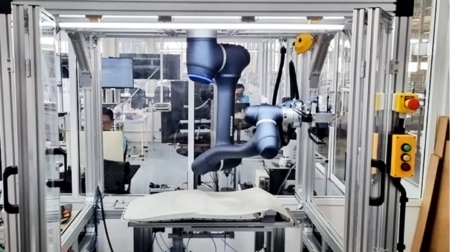IntraLogisteX exhibitor Zebra Technologies has released the findings of its latest warehousing vision study.
The study highlights the growing importance of automation in warehouse operations and the risks of not adopting technology quickly enough.
According to the study, a significant number of warehouse leaders are planning to implement advanced technologies in the coming years.
60% of warehouse leaders in Europe (and 63% globally) plan to integrate artificial intelligence (AI) software within five years, while 64% in Europe (and 63% globally) are focusing on augmented reality (AR).
READ MORE: Robotics & Automation 2025 opens next month!
Additionally, 61% of European leaders (64% globally) intend to increase spending on warehouse modernisation in the next five years, with 62% in Europe (63% globally) aiming to speed up their modernisation timelines by 2029.
This trend is accompanied by projections from Interact Analysis, which expects global warehouse square footage to grow by 27% by 2030, reaching 3.9 billion square meters, up from 3.06 billion square meters in 2023. Warehouse labor spending is also projected to expand at a compound annual growth rate of 7% through 2030.
As warehouse operations continue to grow, the study emphasises the need to accelerate the adoption of automation technologies. Frontline workers have expressed concerns about the impact of slow automation, with 84% of associates in Europe (85% globally) stating that without technological investments, business objectives would not be met.
Furthermore, 73% of workers in Europe (74% globally) feel they are spending too much time on tasks that could be automated, while concerns about safety, fatigue, and the lack of qualified staff are also prevalent.
Warehouse leaders also face challenges in meeting service level agreements (SLAs) and maintaining order accuracy. 55% of European leaders (51% globally) find it difficult to meet fill rates, while 51% in Europe (47% globally) struggle with order preparation. Increasing e-commerce demands are contributing to these challenges, with 40% of warehouse leaders in Europe (37% globally) identifying faster delivery as a major issue.
Automation technologies, including collaborative robots, ergonomic mobile devices, communications applications, and task management tools, are seen as solutions to these problems. Ninety-three percent of associates in Europe and globally agree that the increased availability of these technologies would help attract and retain more warehouse workers. Additionally, 96% of European associates (89% globally) feel more valued when provided with technology tools that improve their work environment.
AI and mobile technologies are expected to have a significant impact on warehouse operations, with 73% of leaders in Europe (79% globally) believing that AI will improve safety by detecting potential hazards and issuing alerts. AI is also seen as a tool to enhance inventory management and streamline stock levels, with 79% of leaders in Europe (77% globally) anticipating benefits in these areas.
Despite the progress in automation, warehouse leaders acknowledge ongoing challenges in supply chain innovation and meeting shifting customer service expectations. However, the study suggests that technology adoption is critical for staying competitive in today’s fast-paced economy.
Key regional findings indicate varying concerns across the globe. In Asia-Pacific, 88% of decision-makers recognise missed SLAs as a major financial burden, while in Europe, safety concerns persist, with 73% of associates worried about injuries.
In Latin America, 70% of decision-makers cite the need to mitigate errors as a primary driver for automation, and in North America, 88% agree that adopting new technology is essential for competitiveness.
Zebra Technologies commissioned this global study to explore the trends and technologies shaping warehouse and distribution centre operations. The study, conducted by Azure Knowledge Corporation, gathered insights from over 1,700 associates and decision-makers across various sectors, including manufacturing, retail, transportation, logistics, and wholesale distribution
Join more than 11,000 industry leaders at Robotics and Automation Exhibition on 25-26 March 2025, at the NEC Birmingham to explore cutting-edge technologies, connect with peers and discover the latest innovations shaping the future of warehousing, manufacturing, engineering and logistics. Register for free now to secure your place at this premier event!








